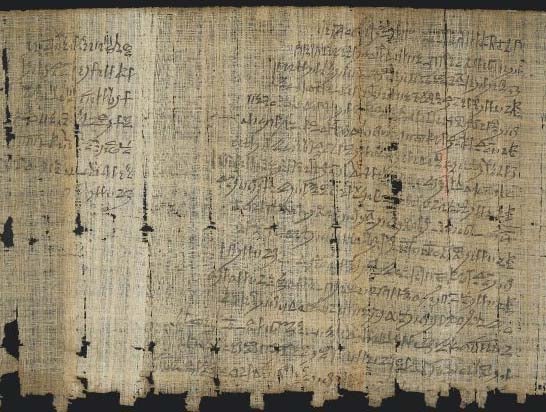Ancient Egyptian papyrus one of the first records of a man called out for sexual assault
Text alleges litany of sexual assault and adultery charges

Your support helps us to tell the story
From reproductive rights to climate change to Big Tech, The Independent is on the ground when the story is developing. Whether it's investigating the financials of Elon Musk's pro-Trump PAC or producing our latest documentary, 'The A Word', which shines a light on the American women fighting for reproductive rights, we know how important it is to parse out the facts from the messaging.
At such a critical moment in US history, we need reporters on the ground. Your donation allows us to keep sending journalists to speak to both sides of the story.
The Independent is trusted by Americans across the entire political spectrum. And unlike many other quality news outlets, we choose not to lock Americans out of our reporting and analysis with paywalls. We believe quality journalism should be available to everyone, paid for by those who can afford it.
Your support makes all the difference.A 3,000-year-old Egyptian text is being reassessed as one of the first records of a powerful man being accused pf sexual assault.
The script, known as Papyrus Salt 124, outlines a list of alleged indiscretions by an important artisan called Paneb, who lived in Thebes in about 1200BC. Its ruins lie within the modern Egyptian city of Luxor.
Paneb was the chief foreman in a community of artisans who built royal tombs in the ancient city.
But his apparent corruption, both legal and moral, led one furious peer to write a complaint to the pharaoh’s chief official.
The history of Paneb is not new as the papyrus was discovered in the 19th century by Egyptologist Henry Salt.
But the allegations regarding his sexual misconduct are beginning to take on new weight in the modern era, when the #MeToo has held powerful men to account for sexual harrassment.
An English translation of the papyrus, by Jaroslav Cerny in 1929, provided details of Paneb’s alleged crimes and prompted Egyptologists to take a real interest in the manuscript for the first time.
The chief accusation by the author, Amennakht, was that Paneb bribed his way to the position of chief workman, a job Amennakht himself was due to inherit.
But he went on to allege a litany sexual assault and adultery charges, although ambiguities in the text make the exact nature of some of the charges unclear.
One allegation of rape, however, does appear clear cut. Amennakht accused Paneb of taking the clothes of a woman called Yemenwaw, before he “threw her on top of a wall and violated her”.
In another, Amennakht relayed testimony by Paneb’s own son Aapehty, who swore on oath examples of “debauchery” by his father, including one in which Aapehty took part himself.
The word Cerny translates as “debauched”, however, does not make it clear whether the interactions were consensual or not.
Rowland Enmarch, senior lecturer of Egyptology at the University of Liverpool, told The Independent the ancient Egyptians considered adultery “morally reprehensible”.
“Sleeping with married women, whether they wanted to or not, was a no-no, and particularly taking them by force just makes it worse,” he said.
Paneb was “probably put to death eventually”, Mr Enmarch said, which “may have had something to do with filching materials from the royal tombs” – an even more serious offence.
“I’m not sure sexual misdemeanours were necessarily capital offences, whereas stealing from the King was,” he added.
It is unclear what eventually befell Paneb, but the case unearthed by Narratively, shows that even in ancient societies, men could be exposed for their unacceptable behaviour.
Join our commenting forum
Join thought-provoking conversations, follow other Independent readers and see their replies
Comments